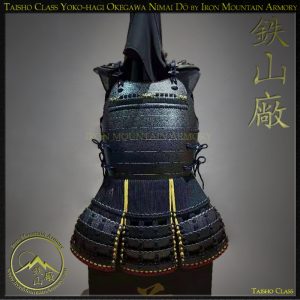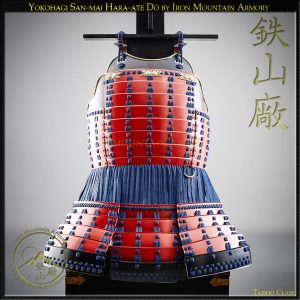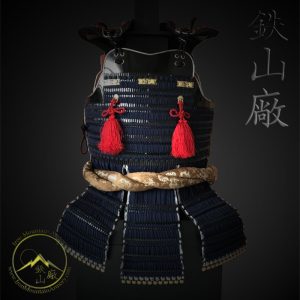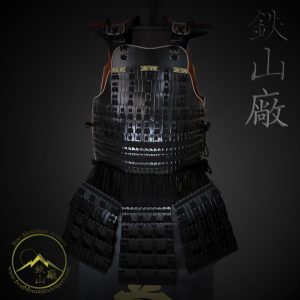- Traditionally Handcrafted
- Customizable
- Shipped Direct From The Armory
- Best Price Guarantee
- World wide delivery
Hishi-nui Nimai Yokohagi-Do is a 2 section chest armor crafted with horizontal plates which are riveted together and feature decorative cross knots. The hishi-nui (cross knots) was a fissionable design during the mid 1500’s as the new tosei (modern) design armor was replacing the older armor crafted from individual scale like plates. The new tosei design featured long steel plates which were riveted together, making a more robust armor. With the new rivets being used, the more expensive odoshi (lace) was no longer needed. So the hishi-nui would be added purely as decoration, to give a resemblance to the older armor design or maybe to show a little extra wealth was invested into the armor.
Just like the katchû-shi (Japanese armor smith) of ancient Japan, Iron Mountain Armory is happy to custom design your samurai armor, in accordance the wishes of our honorable clients. You can select from the many different paint colors, textures and odoshi (lace). Other options as well as sizing are also available.
Features: Gashira Class
Crafted by the Iron Mountain Armory at the time of your order, so please allow 3 to 5 weeks for crafting time.
Ordering Tips: Iron Mountain Armory recommends that you order one size larger AND one size shorter than the size required, as the armor is close fitting. The armor can close into itself if too big, but will be a little uncomfortable if fitted too tall. If you’re planning on wearing a yoroi hitatar or a kikko gane do under your armor, we suggest adding 10 cm to your chest size when ordering. Like other Okegawa Do it features a pin hinge under the left armpit, which can be removed to make it a traditional Ni-Mai Do, after which you can attach a through the hinge.
To see the class differences, please view Kachi Vs. Gashira.
[table id=PF /]
References: “Samurai Armour: Volume I: The Japanese Cuirass” by Trevor Absolon / “Art of the Samurai: Japanese Arms and Armor, 1156-1868″ by Kazutoshi Harada, Metropolitan Museum of Art



